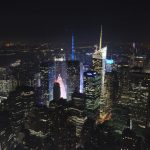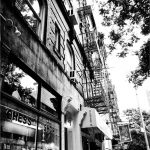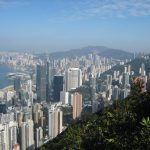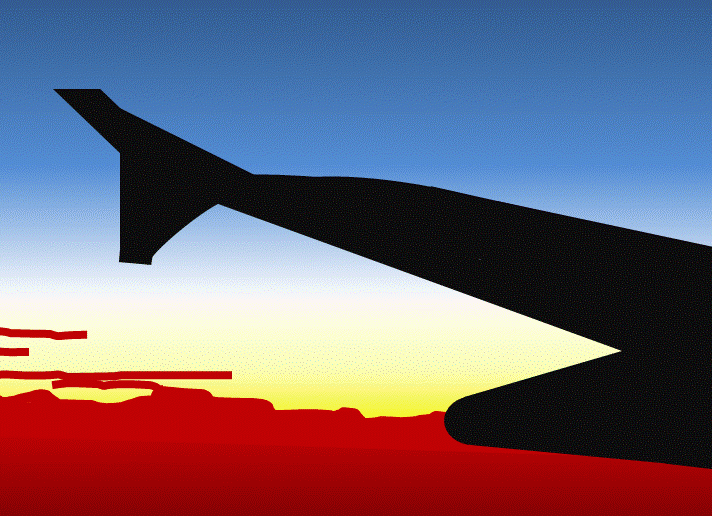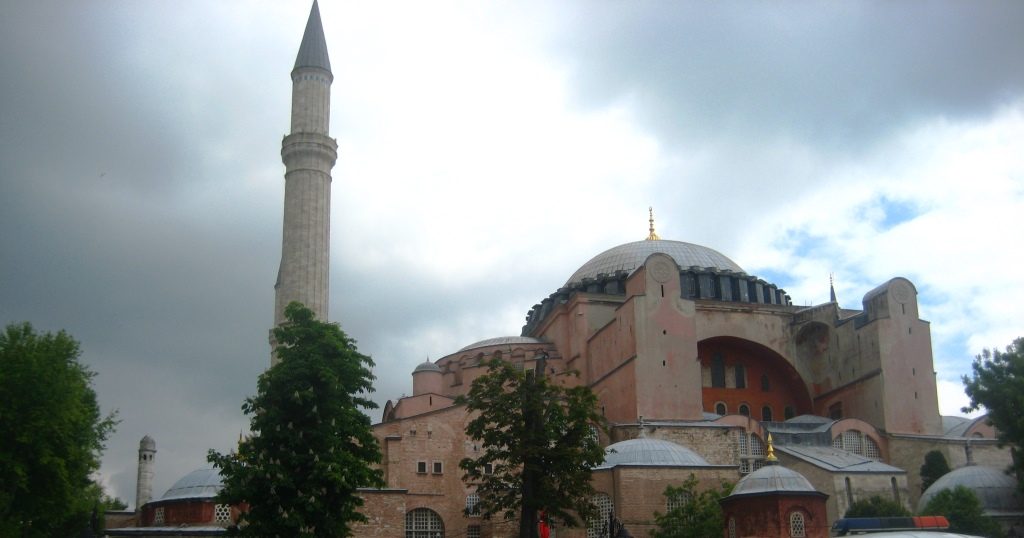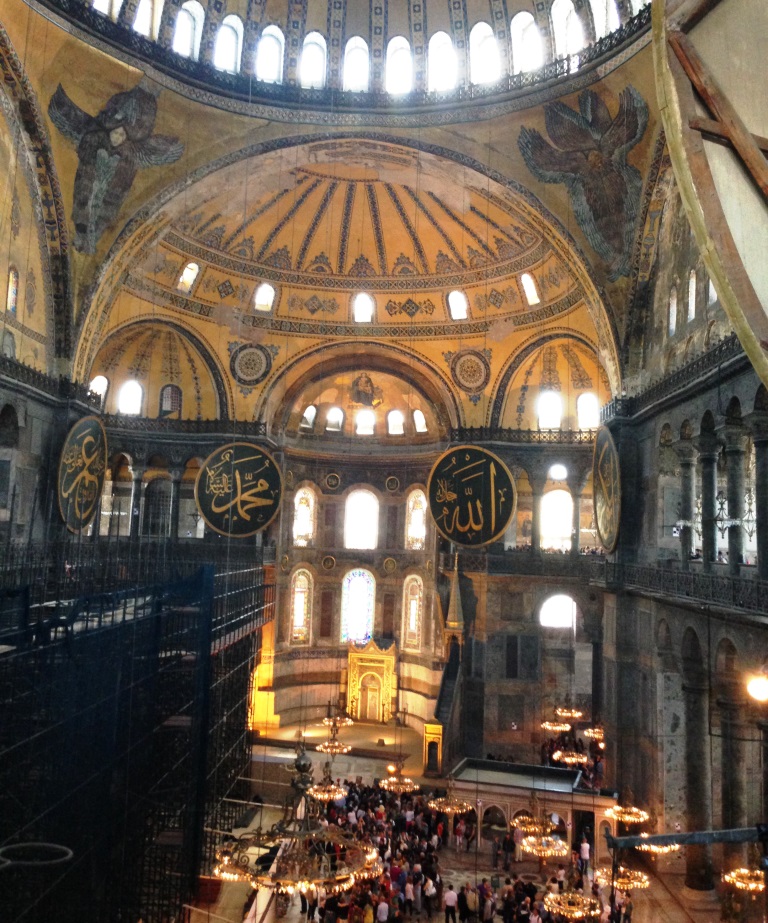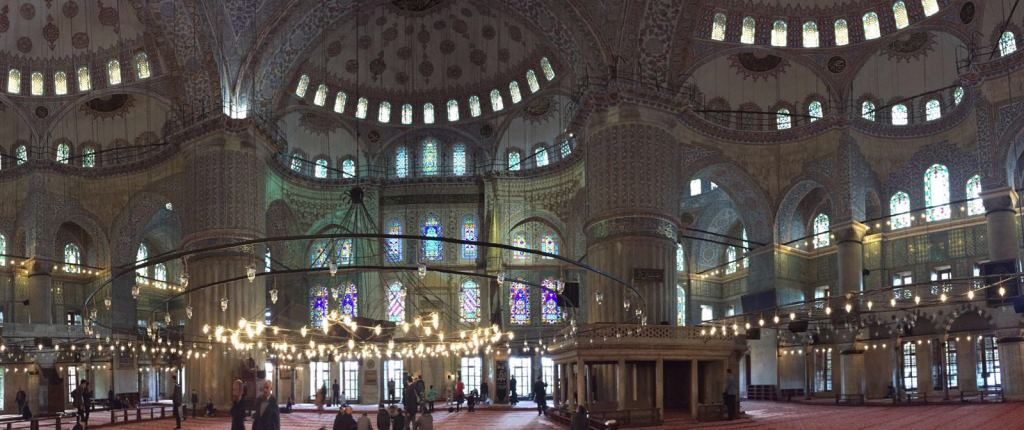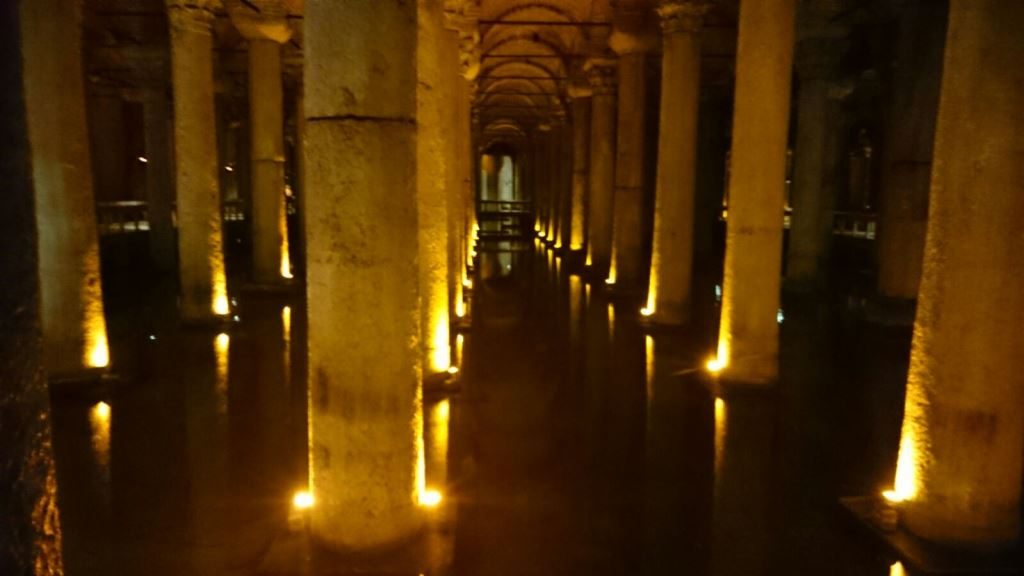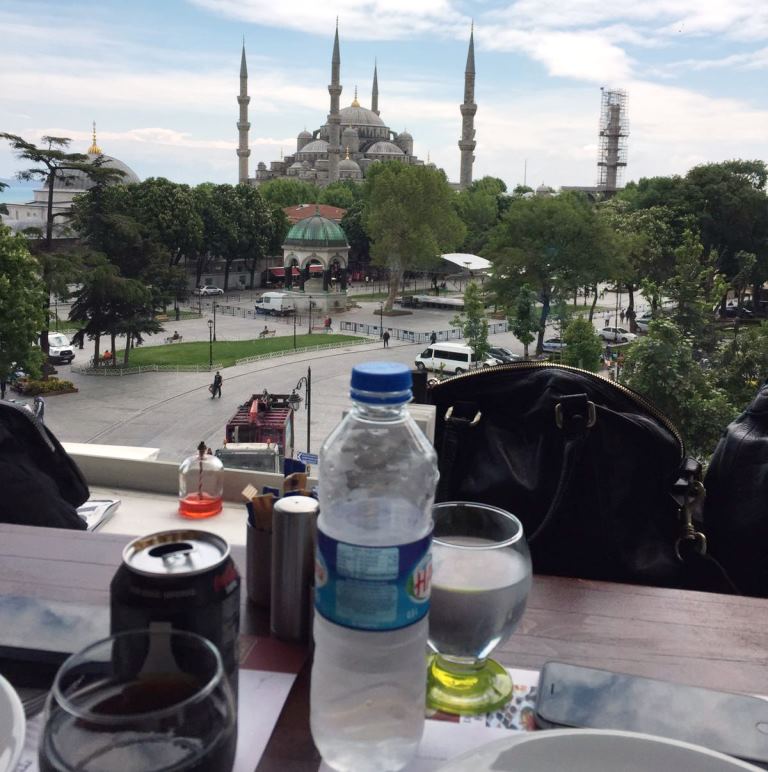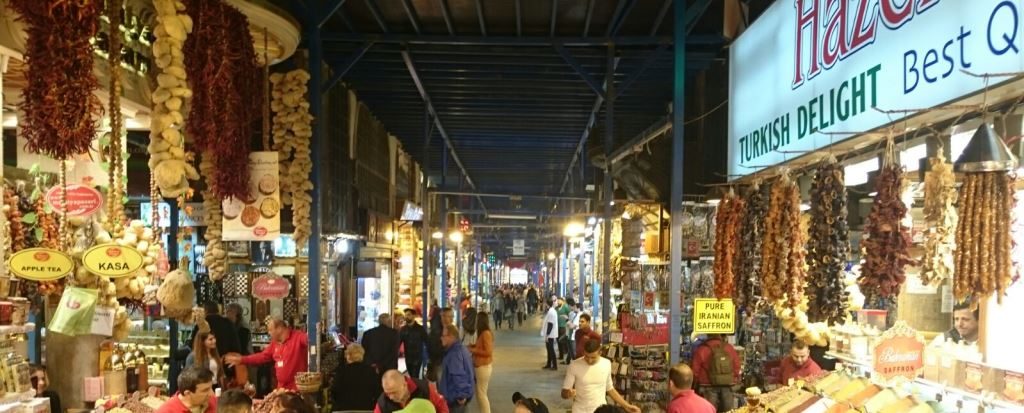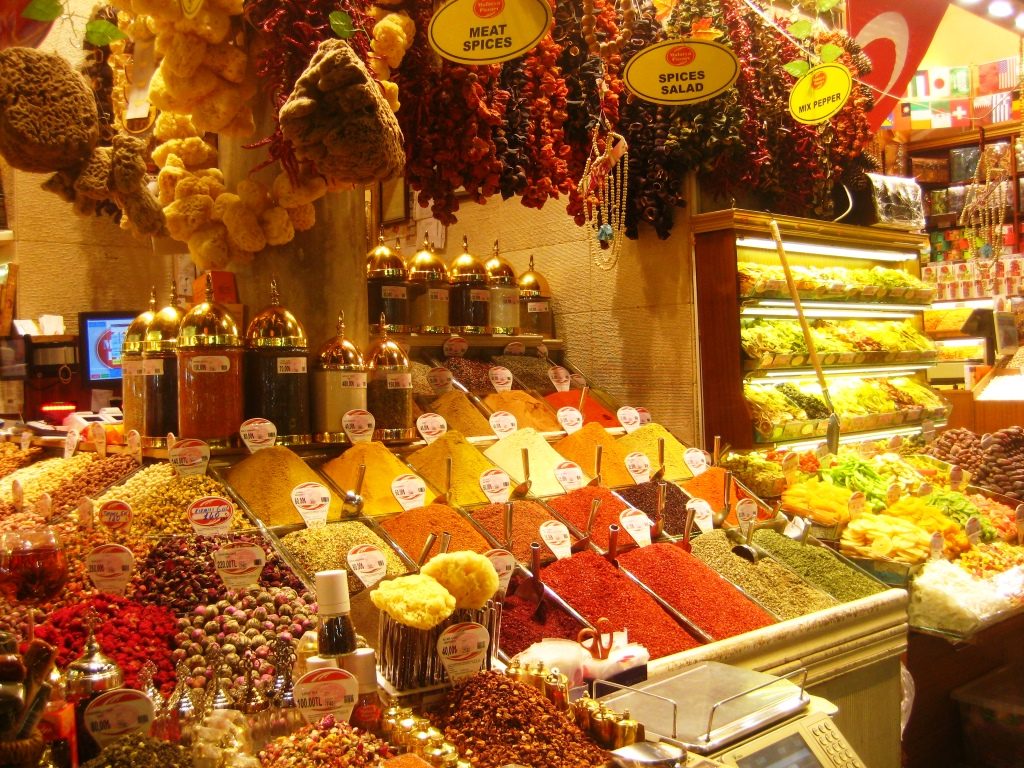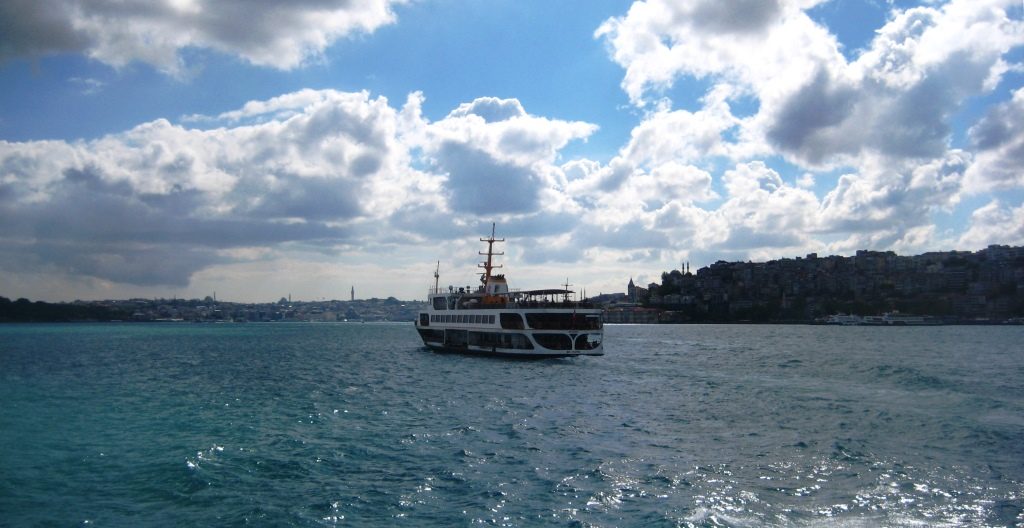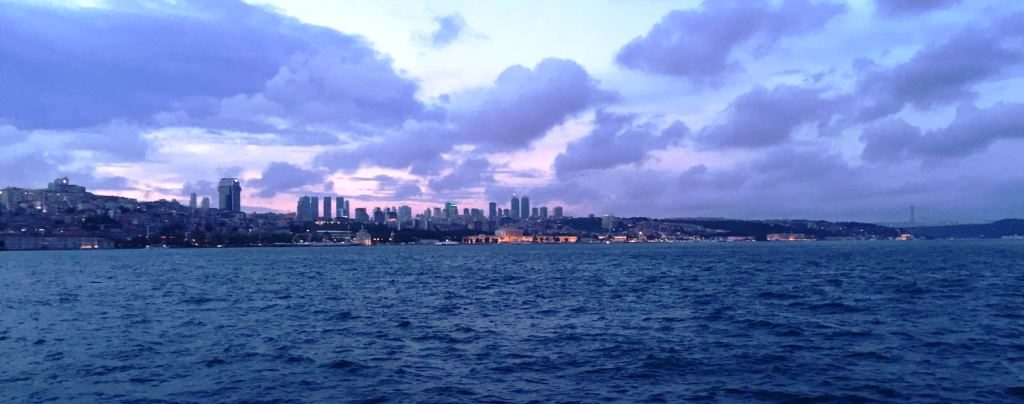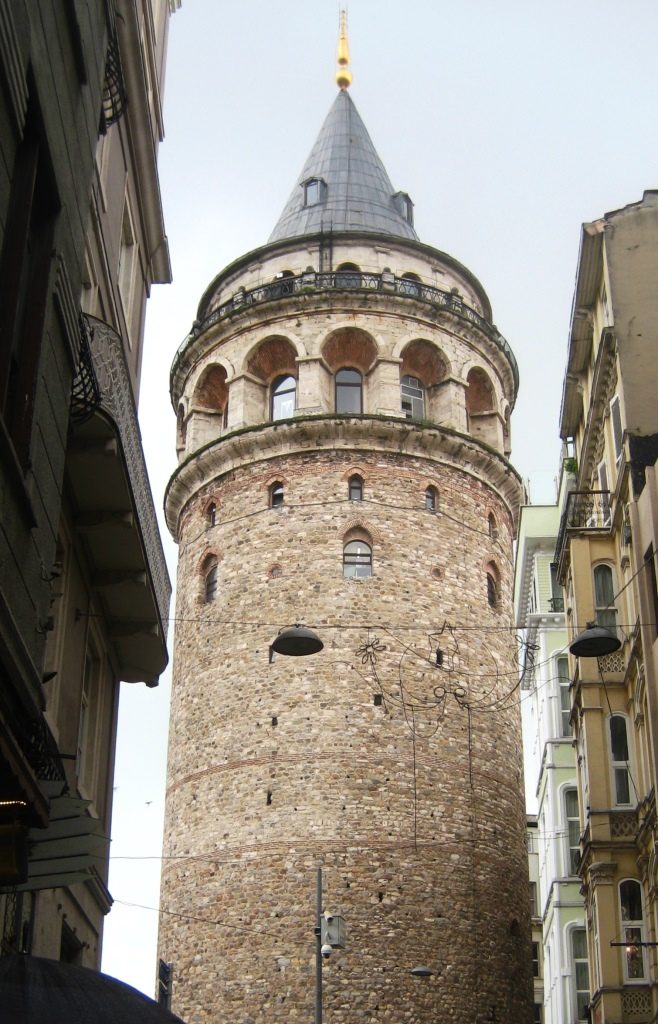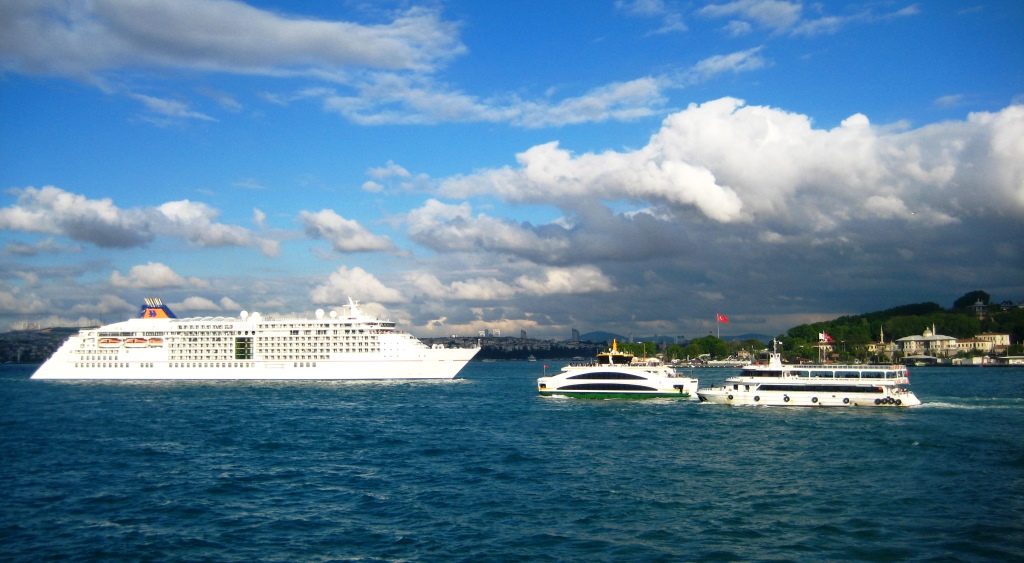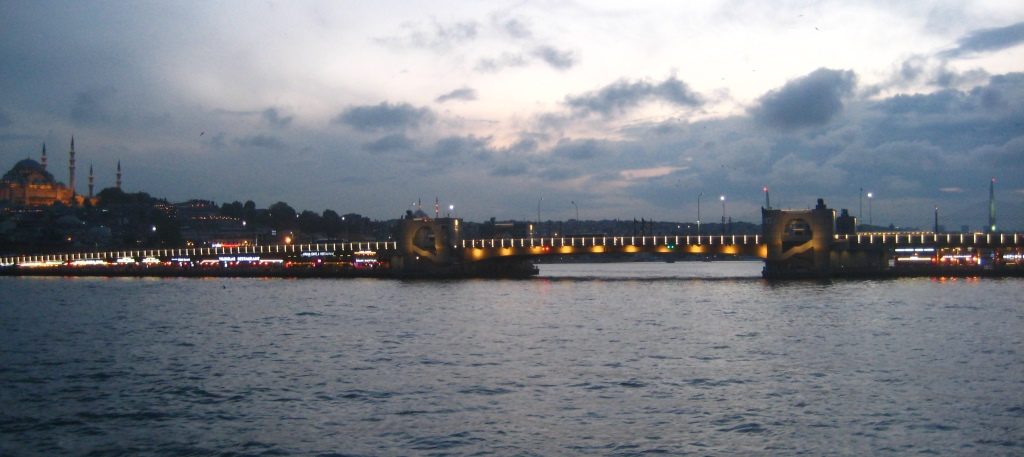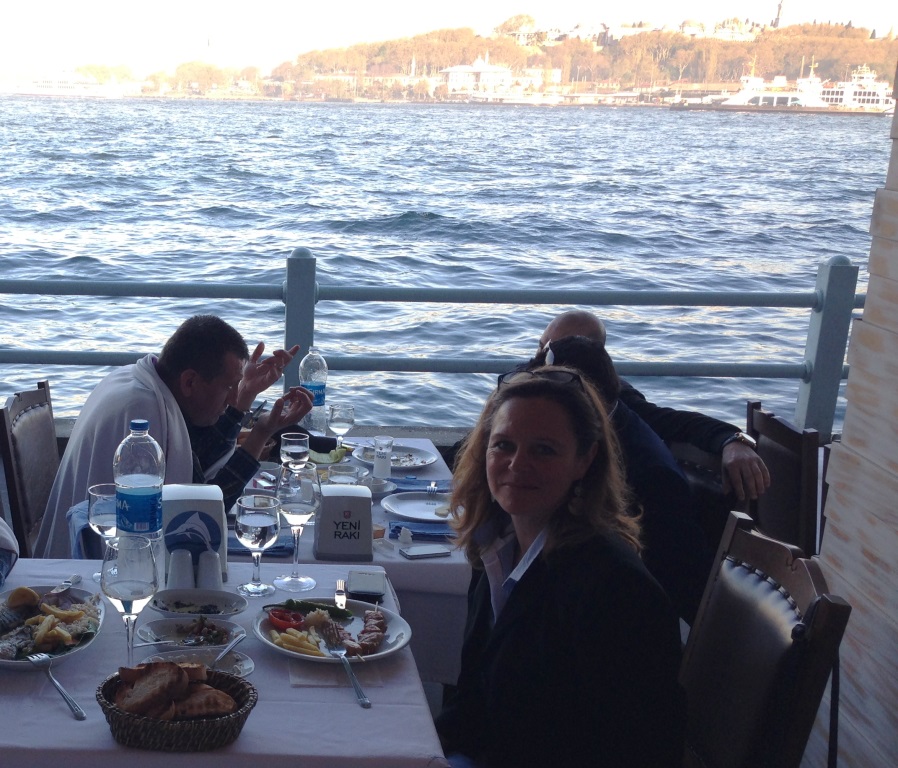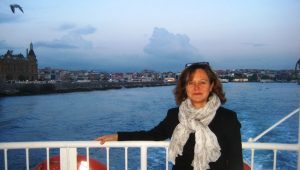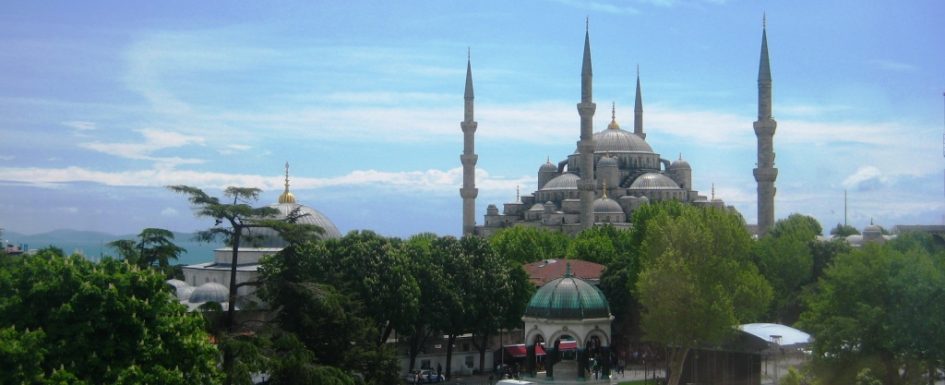
You’ve got just a few hours – maybe a day – to discover Istanbul? Here’s the page for you! “The perfect day in…Istanbul” provides information about THE things to see and do in a day.
Anzeige*
| Destination | Istanbul, Turkey |
| How and when I got there | Return Flights with Turkish Airlines from Duesseldorf to Istanbul Atarürk Airport or Sabiha Gö; April 2011, May 2012, May 2017 |
| Hotel recommendations (see more details below!) | Pera Palace Hotel, Beyoglu, a very famous 5 star hotel in Beyoglu
Adamar Hotel, Sultanahmet, very close to Hagia Sophia and Blue Mosque Antusa Palace Hotel, Sultanahmet, close to the Blue Mosque Idylle Hotel, Sultanahmet, one of many hotels in the area between the Topkapi Palace and the Egyptian Bazaar, medium price range Georges Hotel, Beyoglu, features a Rooftop Terrace with a great view |
| Restaurants / Bars | Galata Marmara Balik (Galata bridge), Eleos Restaurant (Beyoglu), Georges Hotel Galata Rooftop Restaurant (Beyoglu), Roof Mezze 360 (Sultanahmet), Turk Art Terrace Restaurant (Sultanahmet), The Terrace Restaurant” (Sultanahmet) |
| Things to do |
|
| Recommendations in a nutshell | Istanbul is full of interesting spots -ancient as well as modern ones. One day is certainly only a tiny “appetizer” – try to stay longer! |
“The perfect day in…Istanbul” provides information about THE things to see and do in a day – however, one day in this city is definitely not enough! Try to extend your stay and visit attractions not mentioned in the post below, like the famous Dolmabahce Palace or the Museum of Modern Art, an afternoon on the Bosphorus or a trip to one of the picturesqe villages on the Bosphorus like Ortaköy.
8:00 – 09:00
Kahvalti, Turkish breakfast
– that’s pretty different from what you are used to from central Europe. One of the advantages is its richness – after a genuine Turkish breakfast you will probably not need anything else before a late lunch. Of course, you can just go with your hotel breakfast (see my hotel recommendations below), and that might offer all the usual breakfast items a central European person is familiar with. However, if there’s also a selection of Turkish items, have a try!
These are the typical Turkish breakfast components: white bread, butter, honey and jam; different varieties of cheese like a white feta-like cheese ((beyaz peynir) or an old cheese (kaşar peyniri), or an uncured goat’s cheese (lor). Vegetable items like black or green olives, sliced tomatoes and cucumbers also belong to a breakfast table as well some egg dishes like omelettes or a dish called sucuklu yumurta, containing a spicy sausage (sucuk) and boiled eggs. Though white bread is a common breakfast item, Simit (sesame-seed-coated rings, like a Bagel) is the real star of the kahvalti and sold everywhere in the city. Another bread variant might be Pide, a traditional, fluffy bread coated in seeds.
An all-time favorite of mine (at any time of the day) is Börek, thin sheets of dough that are filled with different ingredients like cheese, minced meat or vegetables – I like particularly those with spinach. They usually come wrapped and fried or cooked. And for those who can’t live without: yes, there are usually also some sweet spreads available like pekmez, a kind of molasses, and hazelnut-based spreads like Nutella (your kids will thank you!). And – last but not least – the drinks. Although Turkish coffee is famous, the Turkish people usually drink black tea for breakfast. Only afterwards, a cup of well-made Turkish coffee is enjoyed. And you’re prepared for the day!
09:00 – 12:30
Hagia Sophia:
If you’re staying in Sultanahmet, the historic district, the old town of Istanbul between the Golden Horn, the Bosphorus and the Marmara Sea, most of the today’s highlights are just next door. From Beyoglu, it’s a few minutes by metro or tram. The first stop of the day will lead you to the Hagia Sophia Museum. It opens at 9 a.m. and the earlier you go there, the shorter the queue. Hagia Sophia is an extremely impressive building, considering it was built in the year 537.
At that time it was a church, but in its changeful history, it has been converted into a mosque in 15th Century, and into a museum in 1935. And nowadays, there are rumors about converting it back to a mosque…Anyway, it is an absolute must-see:
Blue Mosque:
Just as our next highlight, the famous Blue Mosque, which is just next door, or better across the square between these two landmarks. The Blue Mosque has been constructed between 1609 and 1616 during the rule of Sultan Ahmed I, and does therefore also carry his name: Sultan Ahmed Mosque, as does the entire district of Sultanahmet. Depending on the time of year, you might face a long queue – my longest waiting time at the Blue Mosque was two hours. However, due to several terroristic attacks over the last years, the number of tourists went down and so the queue might have disappeared. Last time I was there (in 2017), there was almost no queue at all.
Please keep in mind that the Blue Mosque being a Mosque requires some preparations. Women have to cover their heads – you can use any kind of scarf. Which you can buy in case you forgot to bring one:
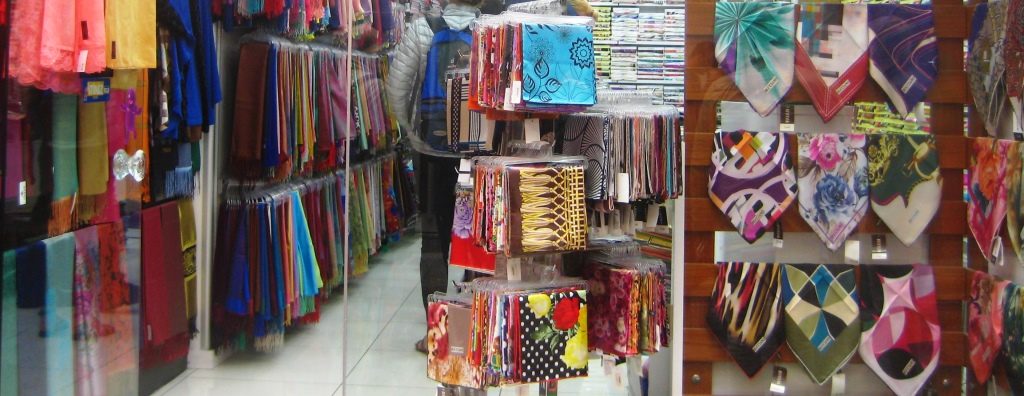 |
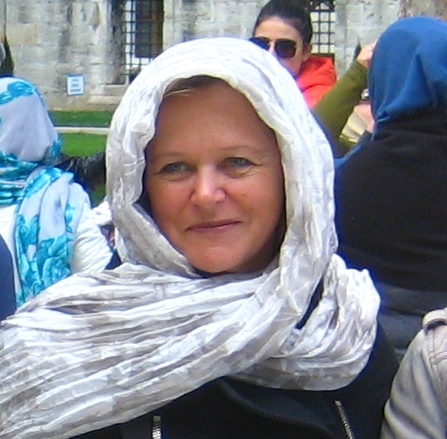 |
Basilica Cistern:
The next highlight of the morning is my all-time favorite place in Istanbul: the Basilica Cistern (Yerebatan Sarnici, which means “Cistern Sinking Into Ground”). It is the largest of several hundred ancient cisterns in Istanbul, was built in the 6th century during the reign of Byzantine Emperor Justinian, and is located 150 metres southwest of the Hagia Sophia. So again – just “next door”.
The Basilica Cistern does provide a very special atmosphere – arcane and mysterious. If you’re lucky and get to see it without hundreds of other tourists (which is getting more difficult since the Basilica cistern featured in the Dan Brown novel Inferno and its 2016 film adaptation), you can stroll along the wooden runways and imagine being in a different world.
In the far left corner, there are famous sideways and upside-down Medusas to visit:
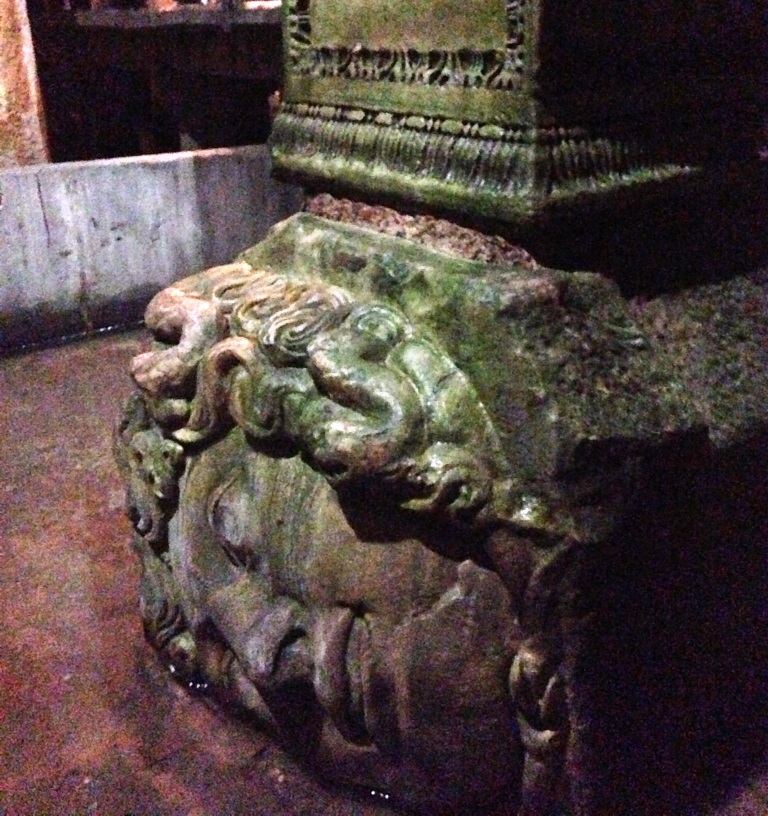 |
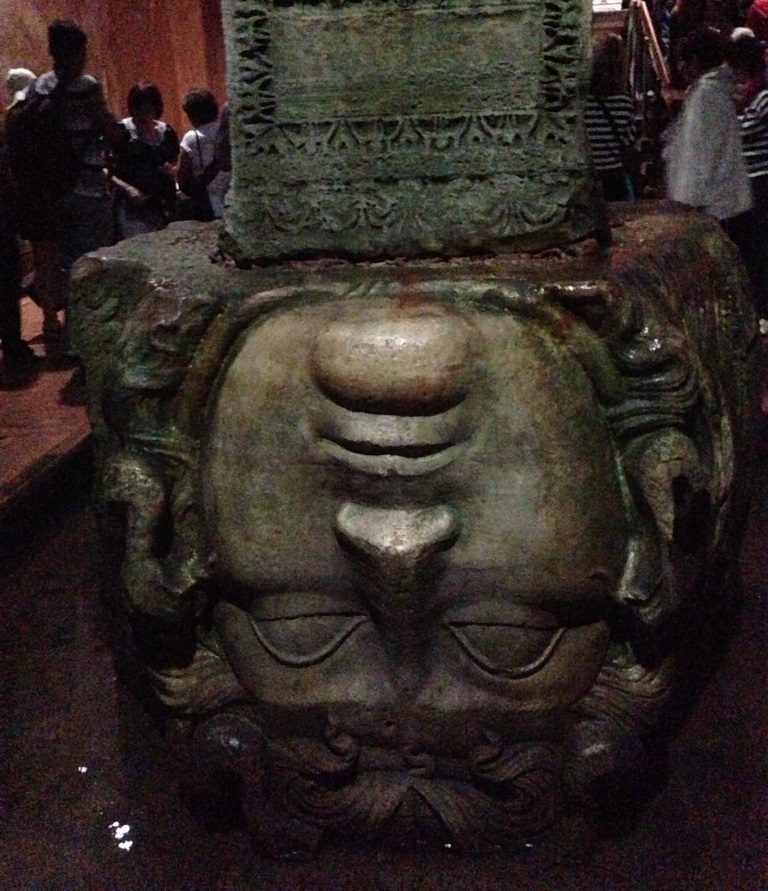 |
I always dread to get back to the surface, but the comparably low temperatures down there help in the end. Depending on the time and weather, you might consider to walk through the Sultan Ahmet Park, the ancient Hippodrome, past the Blue Mosque, to warm up a little.
12:30 – 13:30
Lunch break! After more than three hours of standing and walking, sitting down might be quite appealing. There are many restaurants in the area, in particular along the Divan Yolu street and the smaller side streets. If the weather is nice, go for an “open air” option, like “The Terrace Restaurant”, with a great view of the Hagia Sophia and the Blue Mosque from the rooftop terrace:
If this sounds too touristically for you, then you might like the café of the Archeological Museum, which sits right beside the Topkapi Palace, just a few meters downhill from the Hagia Sophia. The small café is located inside a small yard, surrounded by ancient columns – an astonishingly quiet place within this vivid city.
13:30 – 15:00
Even with just one day available, you should not miss a visit to the famous Topkapi Palace, which is just a few minutes away from the Hagia Sophia and your lunch place.
Although the buildings of the palace are virtually empty, you still get an impression how life within these walls must have been. Even the former harem can be visited. And there’s a café with great views over the Bosphorus to the Asian side of Istanbul:
15:00 – 16:30
Shopping time! Istanbul is famous/infamous for its “Grand Bazaar”, the Kapalı Çarşı. Being visited by some hundred thousand tourists a day, it is one of the largest and oldest covered markets in the world, featuring more than 4000 shops in 61 covered streets. There’s probably nothing you cannot get there. However, Istanbul is also infamous for offering lots of “fake products” like fake designer shoes or handbags. Do not expect to get “a real Louis Vuitton” or Hermès bag for a tenth of the regular price…However, if you are prepared to pay a decent price for a nice, but no-name leather handbag, you will certainly find it. Negotiation is required, and respective skills are definitely a plus. And remember to take your cell phone with a downloaded local map in order not to lose the orientation. The whole Grand Bazaar area is HUGE, and it is quite easy to get lost. Try to enter the Grand Bazaar through a southern gate, and then slowly work your way into northern direction. Ideally, you leave the Grand Bazaar through a north-eastern gate, close to Tarihi Çuhacı Han.
From there, navigate through the narrow streets towards the famous Spice Bazaar (Mısır Çarşısı, or Egyptian Bazaar). Compared to the Grand Bazaar, the Spice Bazaar and its surrounding small alleys is small, but well worth seeing nonetheless. The stands in the Bazaar feature lots of different goods, like piles of spices, sweets (like the famous “Turkish Delight”), or nuts. It’s the perfect place to buy some smaller presents. Just keep in mind that you have to negotiate, if you’re not up to pay twice the regular price (or more).
16:30 – 17:30
Coffee (or Tea) Break! However, before this treat, there’s just a little bit more walking. Head over the Eminönü ferry terminal, very close to the Spice Bazaar. The ferry to Kadiköy on the Asian side of Istanbul goes every 20 minutes forth and back and costs almost nothing.
It’s a very relaxing opportunity to experience Istanbul from the Bosphorus, gives you a chance to spend the day on two continents, and offers a lot of small restaurants and cafes near the Kadiköy ferry terminal for a tea or coffee break. And on your way back, you will have wonderful views of the Sultanahmet and Galata quarter.
17:30 – 19:30
When going back, try to get a ferry not to Eminönü, but to Karaköy (which is just on the other side of the Galata bridge). This saves you – back in Europe – the walk over the Galata bridge. Because now it’s time to explore the modern Istanbul. Head towards the small cable car line called “Tünel” (“tunnel” in English). This is a historical underground funicular line, approx. 600 m long, connecting the bottom entrance at Karaköy with the upper entrance in Beyoglu. Being only a little younger than the London tube, this line is the oldest underground railway on continental Europe. And despite the short ride, it’s nice to try it at least once. At the top exit, you’ll find yourself at the lower end of Istanbuls major modern shopping street, Istiklal Caddesi. However, first turn a little bit downhill and climb the famous Galata Tower.
From there, you’ll have a great view over the entire Golden Horn and the historical district. Back at the Istiklal Caddesi, just walk up the street to its upper end at the Taksim square, also known from the protests a few years ago. Look into the smaller side streets of Istiklal as well – there are many nice small shops, cafes and restaurants. You may walk the same way back, or – if tired of walking – just take the metro from Taksim to the Shishane station. From there, it’s just a short walk down the hill towards the Galata bridge.
19:30 – 22:00
Dinner time! Try to go as large group together – then you can try lots of different dishes. In Turkey, people usually share their dishes. Here’s a list of typical dishes that you should try:
Mezze or appetizers: many different varieties, just ask what’s on offer.
Pide: boat shaped baked dough, filled with many different ingredients like minced meat, or spinach, eggs and sucuk (the spicy Turkish sausage, see above).
Köfte: meatballs; sometimes they even come crispy – a shell of bulgur and a filling of seasoned minced meat, onions, parsley, and pine nuts (which – by the way – can be purchased very cheap at the Spice Bazaar).
Lahmacum, also called “Turkish Pizza” although basically not related to the Italian one; it’s a thin dough, topped with minced meat and different seasonings.
Kebap, coming in different variations; famous is sis kebap – grilled seasoned peaces of lamb or chicken meat on a skewer; other kebap variants are nice as well.
Last but not least, my personal favorite (already mentioned for breakfast): Börek, thin sheets of dough filled with different ingredients. Yummie!
My personal favorite dinner places are the restaurants on the lower level of the Galata bridge, beneath the street level. Just keep in mind, that you can enter the restaurants under the western part only from the western side and the eastern ones only from the eastern side. There are many different restaurants, just have a look at Tripadvisor for something with decent reviews and chose whatever you like, e.g. the “Galata Marmara Balik”. And if you manage to get a table next to the water, you might find some fishing lines just next to you – an interesting experience, in particular when the still living catch is lifted up next to your plate…
Yes – the Galata bridge is a very touristic spot, but the view over to the Topkapi Palace and the Mosques of the old town is unbeatable:
Alternatively, there are some decent restaurants in the Galata quarter that offer rooftop terraces and great views like the decently priced “Eleos Restaurant” or the Georges Hotel Galata Rooftop Restaurant…as well many restaurants around the Hagia Sophia like “Roof Mezze 360“, the Turk Art Terrace Restaurant“, or the already above mentioned “Terrace Restaurant”.
22:00 –
Istanbul, in particular the area around the Galata Tower and the side streets of Istiklal Caddesi, offers many nice places to sit outside and have a tea and a Narghile. Alcoholic drinks are a bit more complicated – the safe place to find a beer-serving bar is either in this area, or a bar of one of the international hotels.
And here some general hints for your visit to Istanbul:
1. Where to stay?
If you’ve got only little time, then look for an accommodation within or close to the old town, in Sultanahmet or maybe Galata/Beyoglu. There are hundreds of hotels in the area, just check out Tripadvisor. Here’s just a small selection:
Pera Palace Hotel, This is a very famous 5 star hotel in Beyoglu, a place full of history, recently nicely renovated. Not cheap, but worth the money!
Adamar Hotel, Sultanahmet, very close to Hagia Sophia and Blue Mosque
Antusa Palace Hotel, Sultanahmet, close to the Blue Mosque, in a busy street full of restaurants, shops, cafes
Idylle Hotel, one of many hotels in the area between the Topkapi Palace and the Egyptian Bazaar – there are many more, and most of them in a medium price range, between 100 and 150 Euros per room and night.
Georges Hotel, in Beyoglu, features a Rooftop Terrace with a great view
Overall, Tripadvisor ranks more than 1.380 hotels in Istanbul – so there are LOTS of others, just check out the hotel reservation portals, like Trivago or Tripadvisor. Not to speak about the lots of B&Bs and vacation rental apartments (which I cannot really recommend, based on a very bad experience with an apartments cancelled by the owner just 8 days ahead of our trip and offering something way less attractive for the same price, leaving us with the feeling that our originally booked apartments did not really exist…).
2. Best travel time:
During summer, in particular July and August, Istanbul gets really hot. Better go in the late spring or early autumn months like May, June or September.
3. Transfer from the airports:
Currently, there are three major airports in Istanbul:
Atatürk, the oldest one and still the biggest and closest to the city. If possible, chose this one, as it is the fastest option to get to the city center, either by metro (line 1, leaves approx. every 6th minute), by bus (bus stop at Taksim square) or by taxi.
The second one is called Sabiha Gökcen, is located in the southeast of Istanbul, and not well connected to the city. The fastest way is either by taxi (approx. 1 hour drive, easily 2 at rush hours); or the taxi to the nearest metro station, and then about 50 minutes by metro.
The newest airport, currently (April 2019) not fully operating, is called “Istanbul Airport” and also not located close to the city center. The current connection to the city center is bad, but should improve once the two planned metro lines are operating, which is supposed to happen in April 2020. However, due to the remote location (approx. 60 km northwest of the city center), a trip to the city will take you an hour minimum, probably more as you will have to change metro lines.
Finally, my favorite recipe from Istanbul: Börek with Spinach and Feta
Ingredients for 4 small servings:
- 3 large Yufka (Filo) leafs
- 200 g Feta cheese
- 300 fresh spinach (clean and dry)
- 150 ml milk
- 50 ml vegetable oil
- 3 large eggs
- 1/2 teaspoon Turkish pepper flakes (Pul Biber)
- 1 teaspoon salt
- Pepper to taste
- black cumin and sesame seeds (for top layer decoration)
Mix the milk, the eggs, the vegetable oil, the pepper flakes, salt and pepper. Spread a bit of oil in a casserole, cover it with Filo leaf peaces. Layer with a third of the spinach and feta, add another layer of Filo pastry (a bit messy – this leads to a certain fluffiness of the dish), brush with a third of the egg-milk-mixture, add spinach and feta; then another layer of Filo pastry. Spread the second part of the milk-egg-mixture on the Filo leaf and put the remaining spinach and feta on top. Finally, cover everything with Filo pastry, add the rest of the milk-egg-mixture. Sprinkle with black cumin and sesame seeds. Bake at 200 degrees centigrade (pre-heated) for approx. 20-25 minutes, until golden. Enjoy!
Greetings from Istanbul!
*According to a German Court decision, all texts containing links to commercial pages (e.g. links to Tripadvisor, Airline, hotel or restaurant websites) have to be identified as “commercial” (in German “Anzeige”). As my texts do contain links like that, I therefore identify each post and page containing a link as “Anzeige”. However (and referring to the “About Me” page) I would like to point out that I do NOT post any sponsored content in my texts; I pay for all my trips myself.

